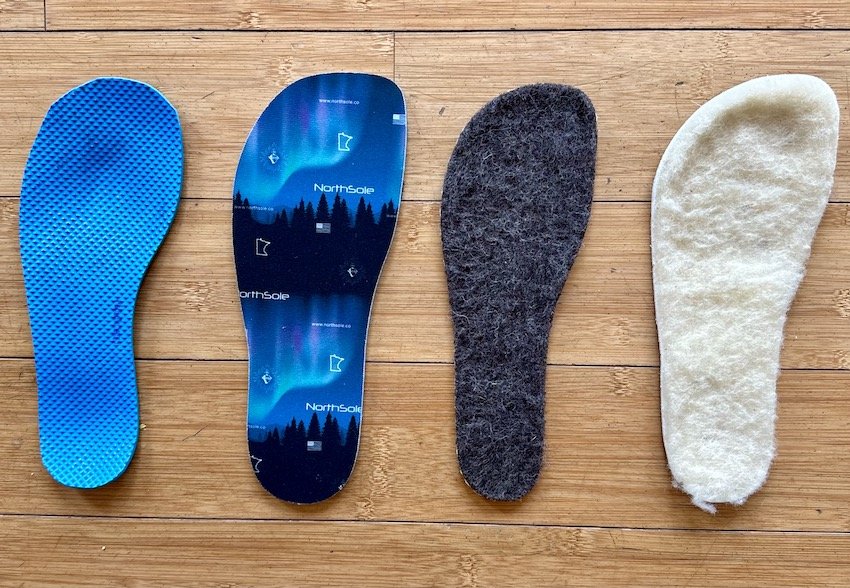
I’ve been wearing barefoot shoes for several years now, and I love using barefoot-friendly insoles in them! They are a low cost way to increase the versatility of your shoes and help bridge the gap between conventional shoes and barefoot shoes.
You see, when it comes to barefoot shoes it doesn’t have to be all-or-nothing. I have a long history of foot pain and it took me a while to get used to the thin, flexible soles on barefoot shoes – insoles have saved me on more than one occasion! Today I use them on a regular basis for a variety of different purposes. Here is how.
What Kind Of Insoles Can I Wear With Barefoot Shoes?
To clarify, insoles does not equal orthotics or support. An insole is simply an additional layer of material you can add to the inside of your shoe. Because barefoot shoes have uniquely flexible outsoles, you want to find insoles that are also flexible so they move with the shoe. In this article we are covering the best insole options that work with minimalist shoes to provide additional comfort, functionality, and in some cases mild support.
A note about orthotics: Orthotics, such as these, can be a short term therapeutic tool if you are recovering from an injury (see my thoughts on arch support here).
But specifically when it comes to barefoot shoes, you want to make sure the orthotic is stable inside the shoe before wearing – the flexible outsoles of barefoot shoes might not keep a rigid insert stable and that can stress the joints in and above your foot. So if you are someone who needs a rigid orthotic I suggest pairing it with one of the thicker, more cushioned options from this list, or at least making sure that the orthotic is stable inside your shoes.
Now let’s get to the insoles I love to use in barefoot shoes!
Insoles for Comfort
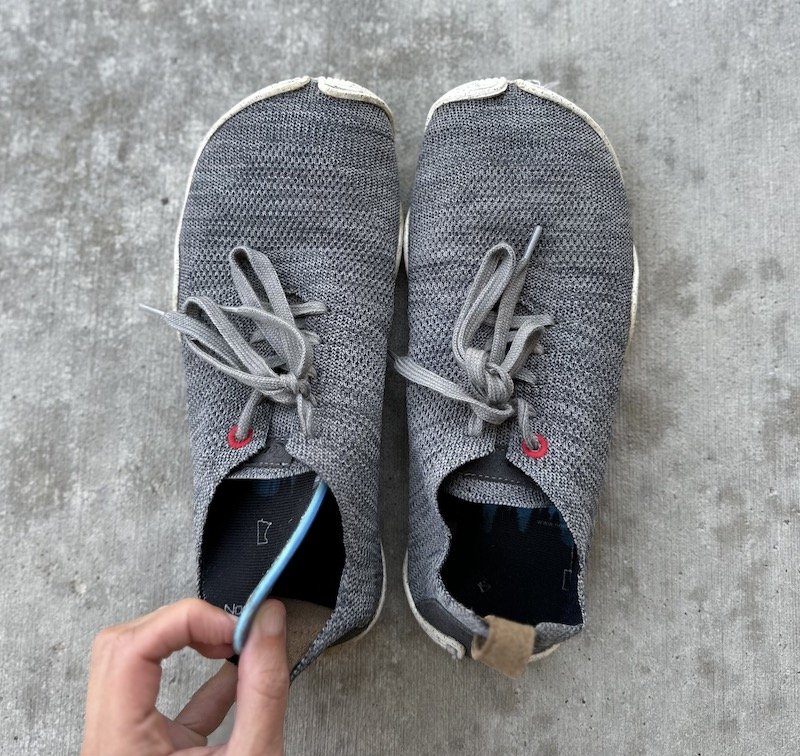
My two favorite insoles for comfort in barefoot shoes are:
- NorthSole – flat, flexible, long lasting
- Bridge Soles – mild arch support and heel lift to aid your transition to zero drop shoes
- Metatarsal Pads – while not a full insole, these provide light support and cushioning under the transverse arch.
NorthSole insoles are completely flat and flexible, they just add cushion. But let me tell you, they can really change things around for you if you are feeling like barefoot shoes are too thin.
Bridge soles on the other hand have mild support and a small heel lift that breaks down over several months as you wear them. I recommend Bridge Soles specifically for people who are transitioning away from supportive footwear, whereas NorthSole insoles can be used forever no matter how functional your feet are.
And finally, metatarsal pads are a useful tool if you have some discomfort in barefoot shoes but don’t want to go to a rigid orthotic. They have alleviate pressure on the ball of the foot and help your metatarsals align naturally. Because they aren’t a full insole, you use it by sticking it on another insole.
Some people, no matter how long they’ve been wearing barefoot shoes, will always want cushion because of their particular anatomy or the environment they walk/stand in. There is absolutely nothing wrong with this. I still use my NorthSole insoles on long travel days or if I’m having a bad joint day! You feet will reap the benefits of your flexible, spacious shoes and they will continue to strengthen even if you have a little more cushion underneath.
Insoles for Warmth & Sock Replacement
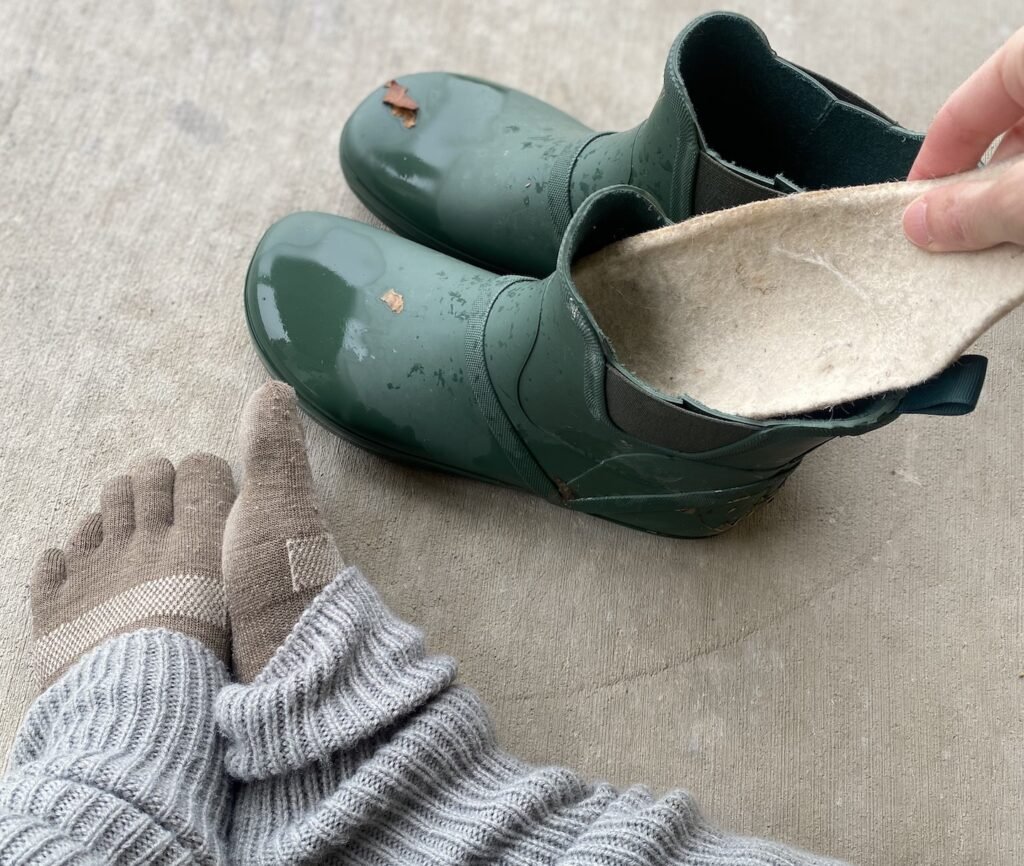
My favorite insoles for warmth and to replace socks are:
- Peerko Wool Insoles
- Wildlings Wool insoles (Felty is extra thick and warm, Woolly is thinner but still warm). Code AWN_ANYA_S can be used for a one-time free shipping offer. If you are outside the US/Canada, use this Wildling Shoes link.
- DIY Felt Insoles
- Softstar Sheepskin
- Amazon Sheepskin
- Vivobarefoot Thermal Insoles (a vegan friendly option, but I don’t find them very insulating)
- Many brands sell warm insoles separately, so when shopping for boots check to see if you can easily add them to your order!
Barefoot shoes are thin. You can talk about your fancy insulating thermal insoles all you want but if you’re feet are sitting on frozen ground, they gonna get cold. Any insole that adds height will keep your feet warmer, but my favorite for warmth are wool and sheepskin insoles. Because we live in a cold climate, we almost always use extra insoles in our barefoot winter boots!
The main thing to think about is how much space they will take up in your shoes. Because warm insoles tend to be thick I often size up in the barefoot boots that I plan to wear them with. If you are looking for a more versatile option, I would recommend Wildling’s Woolly insoles because they are thinner and much easier to fit into shoes.
But the amazing thing about wool and sheepskin is they are not just warm – they are temperature regulating AND absorbent. So if you are someone who really doesn’t like socks, you can use these insoles instead and your shoes won’t get funky. You can also explore socks that don’t squish your toes!
I have also listed Vivobarefoot’s thermal insoles as a vegan option, but I have to be honest. I really don’t find them very warm (and they don’t absorb sweat). They will be better than nothing, but if you are facing serious winter conditions I would recommend something warmer.
Insoles for Performance
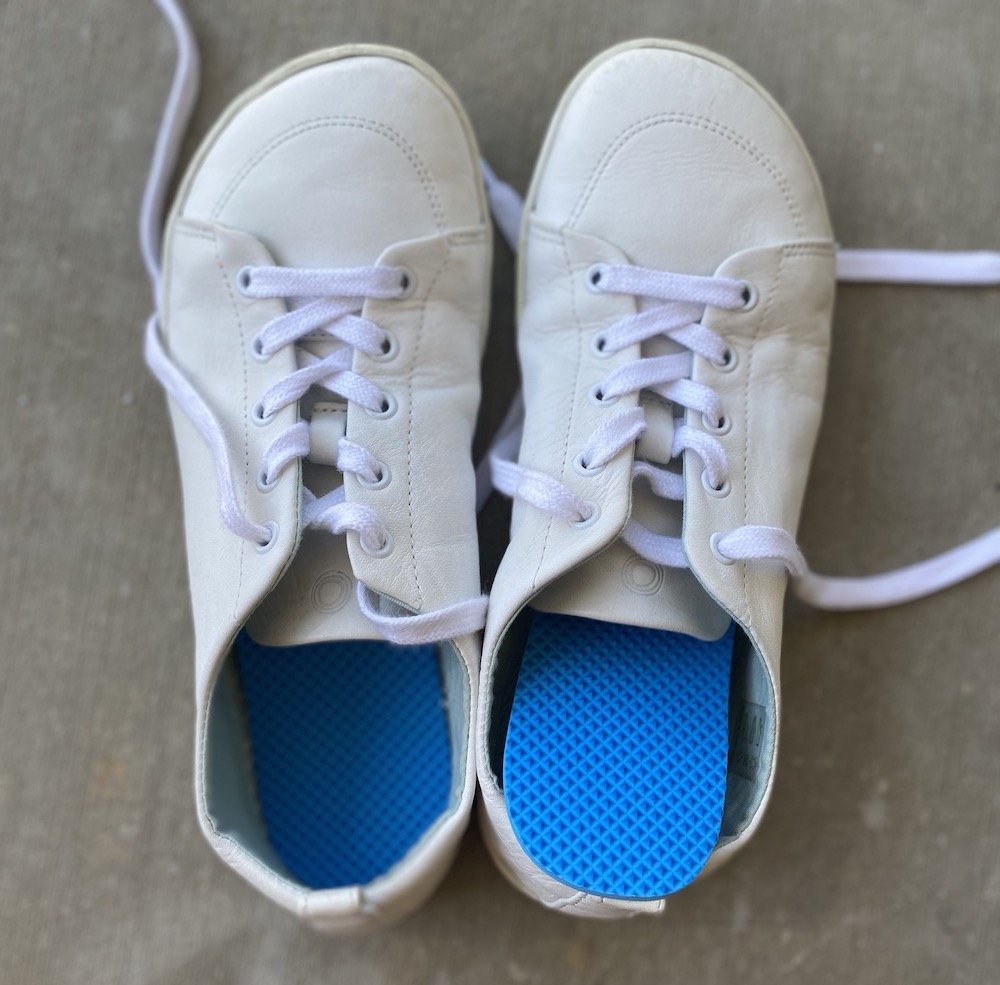
Performance insoles, like from Naboso Technology, use nerve stimulation to improve your gait and posture. Movement originates in the nervous system, so getting the nerves firing through your feet and legs makes it easier to move optimally.
I have been wearing Naboso insoles for several years now, and when I wear them my legs feel more stable and alive. Naboso insoles come with different amounts of stimulation depending on how comfortable you are with texture on your feet.
I am wearing the Activation insoles. They can feel a little rough/overstimulating at first if you aren’t used a lot of feedback on your feet, but over time I have really grown to love it. You can even get a Xero sandal with a Naboso insole on it which is very intriguing to me!
You can use code ANYASREVIEWS10 for 10% off the Naboso e-shop.
Insoles for Shoe Fit
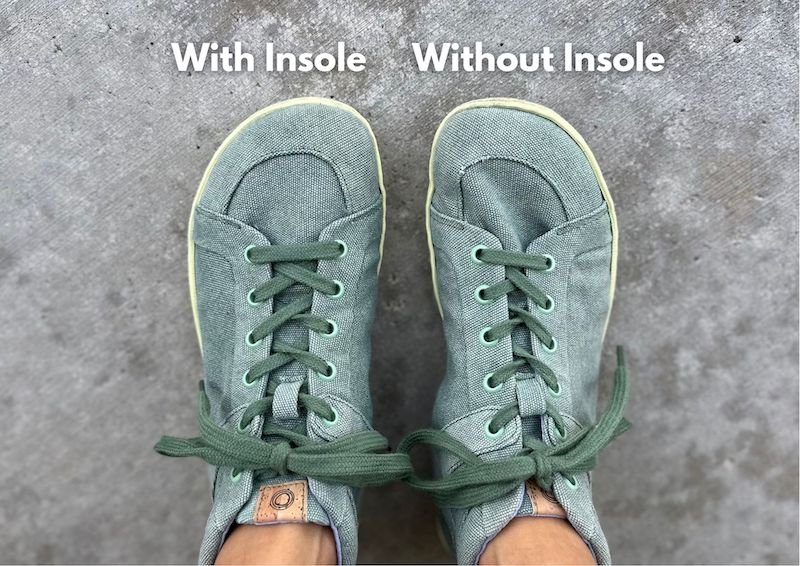
Insoles can also be really helpful in barefoot shoes that are too high volume for your foot. I have low volume feet, so I frequently add a thin insole to keep my foot from sliding around inside the shoe. I can’t tell you how many shoes have been saved using this trick!
Another shoe fit hack: Sometimes insoles don’t fit well in my shoes, so in this case I ditch them and put a felt sticky or moleskin in the shoe upper. Sometimes I use both.
Insoles for Sandals & Flats

Since most of the insoles above don’t work well in open cut shoes, I’ve found some special options that can add some cushion to your sandals and flats! Like other insoles, these can also be used to improve the fit if your shoes are too floppy.
- Foot Petals Cushion – 3mm thick and my favorite for this purpose.
- Adhesive Shoe Liner – intended to absorb sweat and make the inside of your shoes non-slip. They are 1mm thick but come in a 3 pack so you can stack them for more cushion.
- Flat socks – 5mm thick, which be difficult to find into shoes without sizing up. I also recommend buying the largest Flat Sock size and then cutting it down to the right shape.
How Many Pairs of Insoles do I Need?
The convenient thing about insoles is that their purpose can double up. You can make shoes fit better, get more comfort, and extra warmth! I’ve found that a few insoles on hand makes it possible to get by with fewer pairs of shoes, and they can easily be moved around to whatever you are wearing that day! So don’t feel like you need an extra insole for every shoe you own.
Another fun fact is that many barefoot shoes come with removable insoles that you can mix and match with other shoes.
Like barefoot shoes? Make sure check out all the reviews and shoe lists I have here!
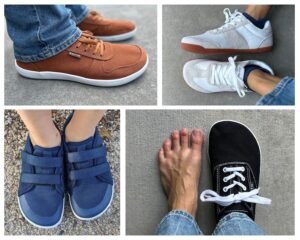


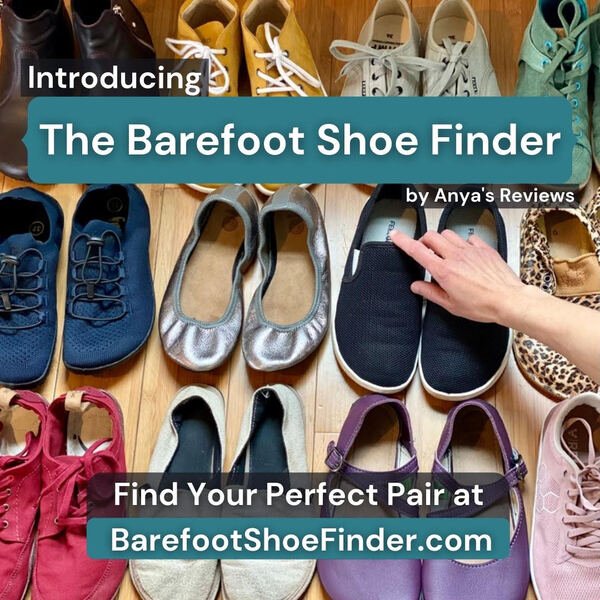
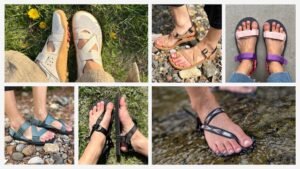
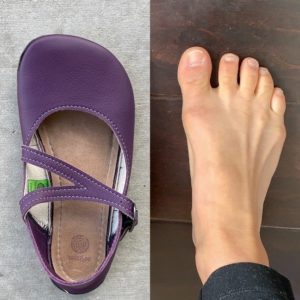







85 thoughts on “The Best Insoles To Wear With Barefoot Shoes”
Hi Anya, after having tried quite a bit of insoles I stuck with those of Freet – they are available in 3mm and 6mm: https://freetbarefoot.com/product-category/accessories. When transitioning, I used the 6mm, now I use the 3mm walking on concrete. Freet says they offer “shock absorption with excellent ground contact”. I agree.
Hello!
I wanted to know a little more about your experience with the Northsole Legacy 3. The website states that they are 3mm height. If I have a pair of Vivos with a 3mm insole currently that I feel does not provide quite enough cushioning will the the Northsoles at 3mm make a difference? I just want to make sure I don’t order something that feels no different than what is already in the shoes. I fear that the 6mm might be too much. ~ Thanks!
3mm is about the thickness of most factory barefoot shoe insoles, but I find the Northsole insoles to be cushier and to last a lot longer without breaking down. So I feel a difference in them.
Hi Anya,
Which insoles would you recommend for the birkenstock Lutrys? I found a temporary solution was to use multiple insoles stacked on top of eachother to fill the space.
Thanks!
NorthSole 6mm insole or Freet’s 6mm Ortholite are what I would try myself, because they are on the thicker side and more comparable to the thickness of the original insole.
I just wanted to say thank you a million times over. 🙂 I’ve learned so much from your articles and website. I sincerely appreciate what you do. I’ve struggled with my feet my whole life. I’ve had 4 foot surgeries. First one at 25 and latest one last spring at 48. Not a single podiatrist or surgeon has even suggested I try strengthening my feet or wearing different shoes. I just can’t wrap my head around it! So much discomfort and suffering- and my body would have done its job all along had I known that it could! I’ve been changing out my shoes, doing all the foot exercises, reading the books, and getting better every day. Thank you, Anya. 🩷🩷🩷
Thanks so much for this happy message! Sending you well wishes as you navigate the foot health journey.
Hi 🙂
We are about to head into our first Manitoba winter after living in BC for four years. I’m wanting to line our kids Vivo snow boots with insoles but I’m wondering if you think sheepskin or felted wool insoles would be warmer? Hoping to find a solution to make these boots work as we have so many pairs from the last few years. 🤞🏻
Hi Ashley! I personally find sheepskin warmer but it does usually take up more space so keep that in mind.
hello everyone,
does anyone know if and where I could buy northsole insoles in de EU?
I couldn’t find anything 🙁
Thanks a lot!
I don’t believe so.
Quick question – which insoles do you find to be the widest – especially through the mid-foot/Arch?
I prefer something natural, like wool, leather, or cork, but I’m open to options.
I’m looking for something to fit in my UnShoes Foragers, which are a wider, moccasin-type shoe. I don’t care much for the foam inserts that come with them, but taking them out affects the fit; and I generally prefer to have a thin insole that can be cleaned or changed out periodically than sweating directly into the shoe – especially since a purchase like these is something I hope to get a number of years out of.
Hoping to find a decent option and I’d prefer to trim a larger)wider insole to fit than to get something too small or narrow that slips around.
Hi! A great choice would be a wool sheet like this that you an cut to fit.
Hi Anya! I love your thorough reviews on everything barefoot related, you’ve helped me out a lot over the past year while I’ve begun transitioning my shoe collection over to barefoot style.
I want to try the Naboso insoles for my Groundies Novas, do you think it would be safest to size up to ensure the insole fits properly? The women’s small activation insole fits up to a 38 (the size I wear), and I’m worried it’ll be too small for a barefoot size 38.
Do you have thoughts or recommendations?
Thanks!
Yeah, that’s probably what I would do in that situation. I think better to go up on and trim to fit, to be sure it’s wide enough in the toe box.
Hi, Anya! I used so many resources from your website when switching to barefoot shoes about two years ago… Now, all of a sudden, I have a sharp and persistent heel pain and it is hard for me to carry on with my everyday activities, and using my old padded shoes seems impossible too. Do you think it will be beneficial to use some heel pads/insoles until the inflammation is under control?
Yes! I’ve done that before and it can be really helpful.
Hi Anya,
I and my 6 yo are transitioning to minimalist shoes (Whitin running), not quite barefoot. We run daily and I notice some minor heel pain and ankle discomfort the morning after. What would be your recommendation for an insole to aid in shock absorption for both myself and kiddo?
The Bridge Soles I have listed here would be my recommendation for that!